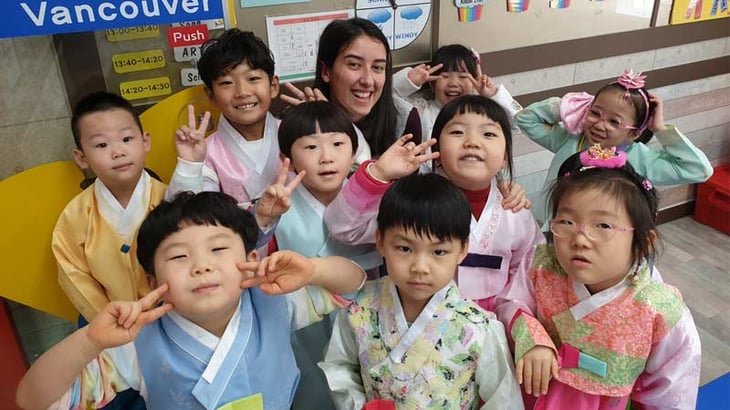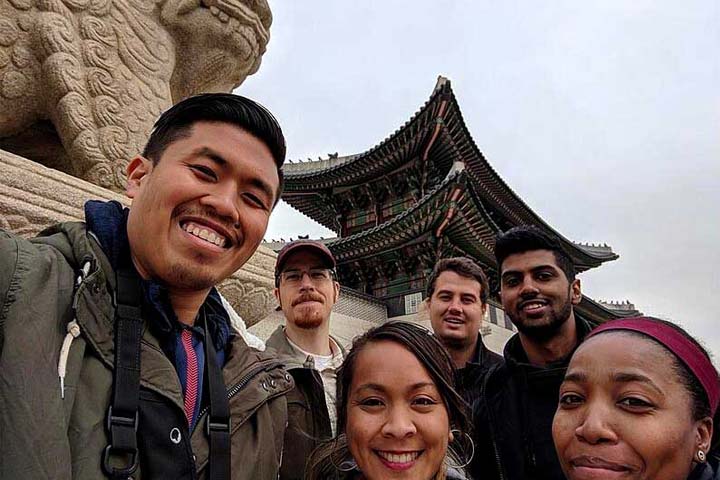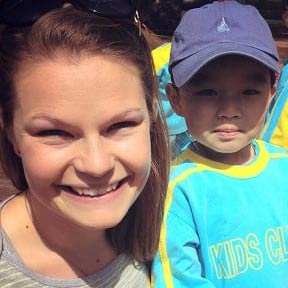The Requirements for Teaching English in Korea
Curious about the requirements for teaching English in South Korea? Learn the qualifications you need to teach English in South Korea including education, citizenship, visa, and more.
Written By: John Bentley | Updated: October 3, 2024
Written By: John Bentley
Updated: October 3, 2024

South Korea is one of the most popular destinations for teaching English abroad. There's much more to South Korea than its attractive English teaching market and great teaching salaries. Its capital city, Seoul, is one of the largest metropolises in the world, and the country boasts a vibrant culture, food scene, and reasonable visa requirements.
What Requirements Do You Need to Teach English in Korea?
To qualify for teaching English in Korea, you need a TEFL certificate and a 4-year bachelor's degree. You must acquire an E-2 teaching visa and be a native English speaker as well. Finally, you must have a clean national-level criminal record, and a clean health check and drug test.
Qualifications to Teach English in Korea
-
Hold citizenship from a recognized English-speaking country ( U.S., U.K., Ireland, Canada, Australia, New Zealand or South Africa)
-
Have a Bachelor's Degree from an accredited college or university (4 years in the U.S./3 years in the U.K.)
-
Possess a clean criminal background check
-
Pass a clean health exam & drug test
-
Hold a TEFL certification (highly recommended)
Read more: How to Get an E-2 Visa for Teaching English in South Korea
Now, remember, these above qualifications are the requirements needed for acquiring an E-2 teaching visa set by the Korean government. Individual employers will have their unique requirements. For instance, the requirements for teaching English in Korean public schools can be different from what's expected for teaching in a private school (or “hagwon”). Let's dive into this below.
Requirements for Teaching English in Korean Public Schools
For some positions, particularly those in public schools and universities, English teachers in Korea may be required to provide the following:
- Proof of full-time teaching experience
- Copy of TEFL certificate (at least 100 hours of class time, either Online TEFL Class or In-Person TEFL Classes)
- Copy of teaching license or certificate
Teaching English in Korean public schools falls under the EPIK program. EPIK stands for English Program In Korea and is sponsored by the Korean Ministry of Education. Upon being accepted in the program, you will be placed in public school positions throughout the country.
Read more: What is the EPIK Program for Teaching English in South Korea?
"The EPIK application process included gathering so many documents (it was intense), so the actual visa process later wasn't so bad. I did make a visit to the Korean Consulate in the Boston area."
Requirements for Teaching English in a Hagwon (Private Korean School)
Hagwons are Korea's for-profit private educational schools. They are distinct from the South Korean public school system and represent the majority of English teaching jobs in the country.
Because there are generally more jobs available at Hagwons than at public schools, it is somewhat easier to get a job at one of these for-profit schools than at a public school.
Note that the basic requirements are similar to public schools, but individual hagwons may have their own requirements.
Read more:
- What is a Hagwon for Teaching English in South Korea?
- Teaching in South Korean Private Schools (Hagwons) vs Public School
"I'm working for Kids Club- a Hagwon chain in South Korea. They helped me get a work visa VERY quickly- there's a lot of paperwork but it finally got sorted."
Additional Documentation Required to Teach English in Korea
All English teachers in Korea must apply and interview for positions – this can be done through a variety of recruiters and government programs, as well as directly through language schools and institutes.
To legally teach English in Korea you must meet certain standards and be able to provide certain documentation. In many cases, documents must receive an international notarization known as an Apostille.
During the process of applying and interviewing for English teaching positions, and getting a visa processed at the consulate after signing a contract, prospective teachers should expect to be able to produce the following documents:
- Bachelor’s and/or Master’s degree/diploma
- Sealed college or university transcript
- Original national-level criminal background check (FBI in the U.S.)
- Passport photos
- Original contract (to be provided by your employer for visa processing at the consulate)
- Original passport that is valid for at least one year
For more information on teaching English in South Korea, including job markets and finances, check out our South Korea Country Profile.
Popular FAQs about requirements for teaching English in South Korea
Is there an age limit for teaching English in South Korea?
The official retirement age is 60, but there is a strong preference for hiring teachers between the ages of 21 and 40. Older teachers may find more opportunities in schools outside of major cities, particularly if they possess advanced teaching credentials and experience. The official age limit for the highly competitive EPIK Program for teaching English in public schools is 62, though there is still a preference for younger teachers.
Can I teach English in South Korea even if I don't speak any Korean?
Yes! It is not required that you know any Korean to get hired to teach English in South Korea. In fact, the vast majority of English teachers in Korea arrive with little to no knowledge of the Korean language. With ubiquitous signs and digital translators, it is surprisingly easy to get around, and most teachers will learn at least some Korean, which makes the ins and outs of daily life - ordering in restaurants, saying hello to neighbors, shopping, etc. - much easier and more pleasant.
Pro Tip! To ease your transition to life in Korea, consider taking an ITA Korea Culture Course, that will provide you with an insightful and practical introduction to life in Korea, including Korean culture and history, and tips for adjusting to daily life.
- 10-Hour Online Korea Culture Course
- 40-Hour In-person Korea Culture Course offered in Incheon, South Korea
Do I need a degree in education or teaching experience to teach English in South Korea?
No. In fact, most folks who teach English in Korea are first-time English teachers, and many will earn promotions and raises as they gain more experience if they decide to teach in Korea for more than a year or two. Indeed, holding a degree in education and possessing experience as a teacher will enhance your opportunities and open doors for teaching English in South Korea - and you may qualify for more senior positions and a higher salary. However, with an accredited TEFL certification, as a native or fluent English speaker, you can get hired to teach English abroad in dozens of countries worldwide. One key is to get an accredited TEFL certification that includes live practice teaching (practicum), which will provide you with live teaching experience.
Read More: Can I Teach English Abroad without Teaching Experience?

What is the Process for Getting a Job Teaching English in South Korea?
Here's a brief overview of a 6-step plan for how to achieve your goal of teaching English in South Korea.
1. Research & Make a Viable Plan for Teaching English in Korea
Request a free Guide to Teaching English in South Korea for teaching English abroad or call 773-634-9900 to speak with an ITA expert advisor to discuss your options and questions about teaching English in South Korea and around the world.
You should also check out Teaching in South Korea Country Profile our Alumni Articles & Blogs, where you can check out numerous firsthand accounts of teaching English in South Korea and dozens of other countries around the world. These resources will also outline your options for teaching in private language schools (hagwons) and in government programs like EPIK.
2. Get TEFL Certified
Earning an accredited TEFL Certification will provide you with the skills you need to actually function successfully as a teacher and it will provide you with a recognized qualification that thousands of language schools and institutes in South Korea and around the world seek and require when hiring new English teachers.
3. Prepare for Your Job Search
Build your customized CV and cover letter. Get the documents you may need to apply for positions and to get a visa, such as a criminal background check. Research different areas of the country where you might want to live. If you're an ITA student or graduate, reach out to other ITA students through our Alumni networks to ask any questions.
4. Apply & Interview for Teaching Positions in South Korea
You will apply and interview for positions in Korea from home, conducting interviews via phone and Zoom. Generally, you can start this process once you have begun your TEFL class and have certain documents prepared, including your national criminal background check. Most interviews are conducted over the phone or by Zoom.
- Note that private language schools, known commonly as hagwons, recruit and hire English teachers year-round.
- Public school applications are typically accepted and interviewing begins at the beginning of April for August/September start dates, and on October 1 for February/March starting dates.
5. Sign a Contract with a Korean School, Make Visa & Travel Arrangements
After accepting a job offer, you will need to sign a contract, submit the required documents, and visit the nearest Korean Consulate to obtain your E2 teaching visa. Typically, your new employer and recruiter will help you organize the necessary paperwork. Additionally, your employer will assist with making flight arrangements. This process can often take at least a month or two.
6. Go to South Korea & Enjoy the Adventure of a Lifetime Teaching English Abroad!
Your employer will typically assist with making travel arrangements, including pick-up and accommodations upon arrival. Your school, including other foreign teachers who are colleagues, will typically provide support and guidance for adjusting to your new life as an English teacher in South Korea. Please don't hesitate to reach out to your ITA advisor with further questions. We're here to help!
Build Your Skill Set & Marketability with Advanced TEFL Training
Enhancing your expertise and refining your TEFL skills can unlock pathways to career growth, including opportunities for promotions, and salary boosts. This is especially the case in a country like South Korea, where school directors and students (and students' parents!) seek out the best-qualified teachers with the most credentials and highest levels of training.
Here are six advanced TEFL training courses to help you build your ESL teaching skills and boost your resume:
- Foundations of English Grammar - Perfect your skills by getting even more in-depth grammar trainin and gain further confidence in front of a classroom.
- Teaching English to Young Learners - This is especially relevant for those looking to teach in South Korea, where the vast majority of positions entail teaching English to children.
- Teaching Business English - If you plan on teaching adults in South Korea, this course is ideal.
- Teaching English Online - Perfect for those who want to teach English online to generate extra income, white teaching in Korea or elsewhere.
- Teaching Test Prep Skills - Many Korean students seek extra training to help pass standardized English tests to qualify for certain jobs, or to study in English-speaking countries.
- Tutoring English - Get specialized training for working as a private tutor.
Many folks who get TEFL certified are looking to only teach English abroad for a year or two. Should you decide that you want to make teaching English as a foreign language (TEFL) your primary career, you may want to invest in a degree in a field like TESOL (Teaching English to Speakers of Other Languages), which is often required to teach English in public schools in the U.S.
Teach English to Private Students
Providing private English language tutoring is a thriving industry both globally and in South Korea. Many English teachers in Korea choose to offer private tutoring to boost their earnings and to connect with individuals in your local community while teaching overseas. In a country like Korea, very often you won't even have to market yourself as very often neighbors, people you meet around town, and even your own students at school will approach you asking you if you offer private tutoring.
To boost your earning potential, consider focusing on teaching Test Preparation for Standardized English Proficiency Exams. Each year, millions of people globally, including thousands in Korea, take specialized courses to prepare for exams like TOEFL, IELTS, and TOEIC. Excelling in these tests is essential for those aiming to enter English-speaking universities or obtain jobs that demand strong English skills. Many test-takers are willing to pay a premium for personalized instruction from qualified English teachers to help them reach their objectives. As an English teacher, you can earn between $35-$55 per hour by helping students with these exams, either as a private tutor or by teaching specialized test prep classes at a school or language institute. This rate is significantly higher than the typical $10-$25 per hour for general private tutoring sessions.

Conclusion: Follow A Plan to Realize Your Goal of Teaching English in South Korea
Teaching English in South Korea is an exciting and rewarding opportunity, but it requires thorough preparation and meeting specific requirements. A TEFL certification and a bachelor's degree are essential, along with securing an E-2 visa and passing health and background checks. Whether you choose to teach in public schools through the EPIK program or at private hagwons, understanding the distinct requirements for each setting is crucial. Following a structured plan—from obtaining your TEFL certification to interviewing and securing a position—will help you navigate the process smoothly. With the right qualifications and a proactive approach, you can embark on a fulfilling journey of teaching English in South Korea and immerse yourself in a vibrant culture.
Go Further:
Posted In: Teach English in South Korea, Teach English in Asia, Teach English Abroad Visas, Teach English in South Korea Must Read
John Bentley
Co-Founder at International TEFL Academy
John Bentley is Co-Founder & Senior Writer for International TEFL Academy (ITA), the world leader in TEFL certification for teaching English abroad. A graduate of Harvard University and the Medill School of Journalism at Northwestern, John is a recognized expert in the field of TEFL. His articles have appeared across the field's top websites, including GoAbroad.com, StudyAbroad.com, InterExchange, GoOverseas.com, Adventure Teaching, & many others. He has also spoken as an expert on Teaching English Abroad & TEFL certification at major conferences like MeetPlanGo and Lessons from Abroad (LFA) in Portland & San Diego.
Want to Learn More About Teaching English Abroad & Online?
Request a free brochure or call 773-634-9900 to speak with an expert advisor about all aspects of TEFL certification and teaching English abroad or online, including the hiring process, salaries, visas, TEFL class options, job placement assistance and more.







 "The EPIK application process included gathering so many documents (it was intense), so the actual visa process later wasn't so bad. I did make a visit to the Korean Consulate in the Boston area."
"The EPIK application process included gathering so many documents (it was intense), so the actual visa process later wasn't so bad. I did make a visit to the Korean Consulate in the Boston area."  "I'm working for Kids Club- a Hagwon chain in South Korea. They helped me get a work visa VERY quickly- there's a lot of paperwork but it finally got sorted."
"I'm working for Kids Club- a Hagwon chain in South Korea. They helped me get a work visa VERY quickly- there's a lot of paperwork but it finally got sorted." 
